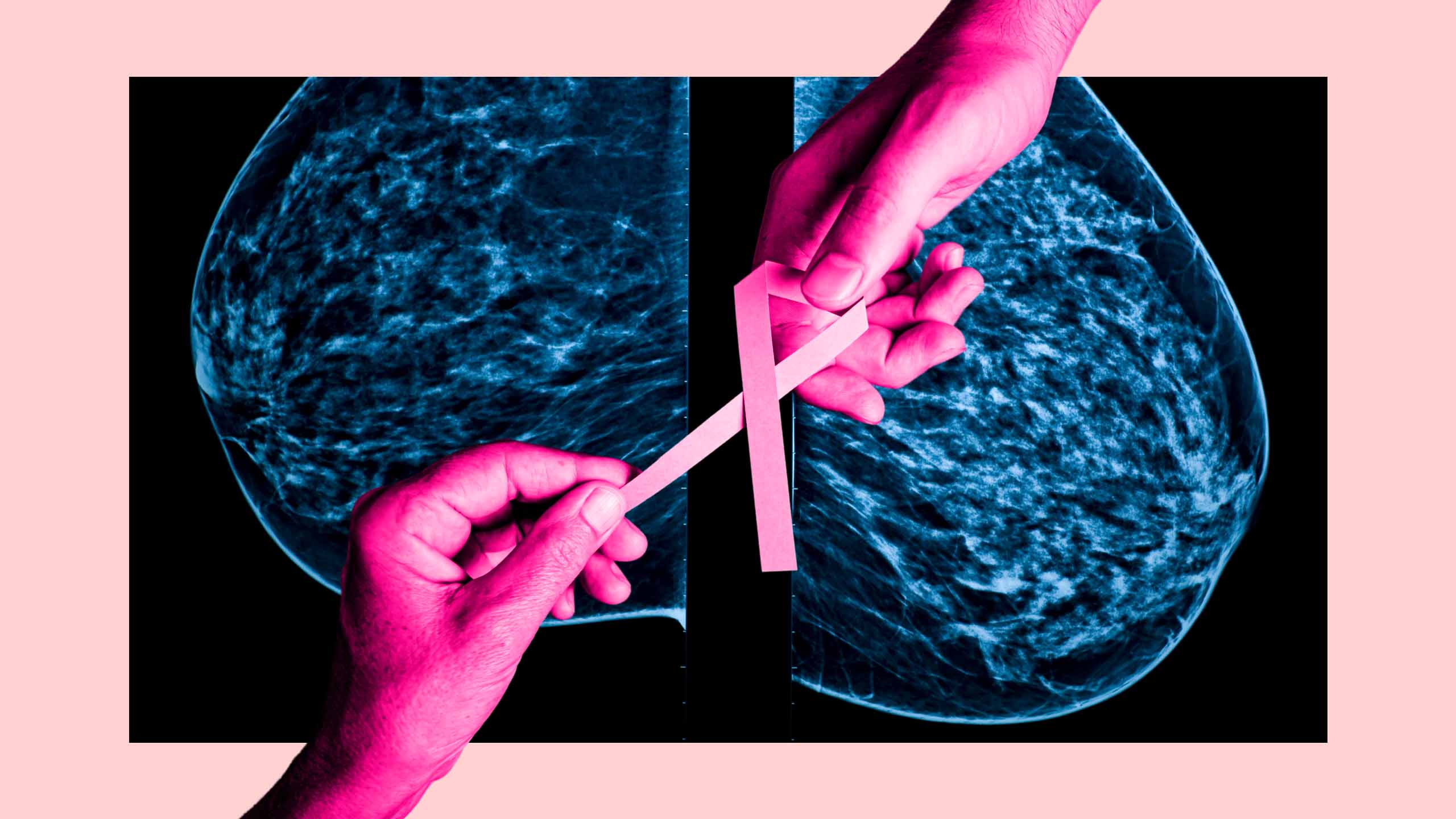Ash Davidson, a trans DEI consultant, underwent top surgery before their 43rd birthday in October last year. “It was one of the most exciting things I’ve experienced after four decades living in a body I was never fully comfortable with,” he says.
Before his surgery, taking care of his chest health hadn’t been easy. “I dreaded getting a mammogram. The process of testing and screening for breast cancer sounded awful—wearing a pink gown, having my breasts smashed and handled by a stranger and experiencing what’s a “rite of passage” for women,” Davidson says.
Eleven days after their top surgery, Davidson was informed that a cancerous tumour had been removed. This left him puzzled: six months prior, an abnormal mammogram led to an ultrasound on his left breast that didn’t reveal anything. He had received a clean bill of health—and now worries that his haste to get the mammogram over with led him to not advocate for himself, ask questions or request a second opinion. After his cancer diagnosis, he underwent chemo and radiation and is currently in remission.
Like Davidson, many trans folks struggle to access preventative care due to discrimination and barriers in healthcare. In June 2023, for the first time in its 40-year history, the Human Rights Campaign declared a national state of emergency for members of the LGBTQ2S+ community focusing on healthcare concerns.
Studies show it takes queer and trans people almost twice as long to be diagnosed with breast and chest cancer as straight cis folks. “Delayed diagnosis most likely leads to more aggressive treatments like chemotherapy and lymph node dissection and worse outcomes,” says Dr. Robyn G. Roth, a board-certified radiologist in New Jersey who specializes in breast imaging. The research found that 38 percent of LGBTQ2S+ folks refused traditional treatment.
Trans people face particularly bad health outcomes. “Early breast cancer detection leads to better outcomes and lower morbidity. Unfortunately, trans people face three times higher risk of recurrence,” Dr. Roth says.
Many trans patients have to contend with refusal of care, misinformation, dismissed symptoms, lack of insurance and medical gaslighting. Trans patients, along with other members of the LGBTQ2S+ community, may experience harassment and mistreatment by healthcare professionals.
“Medical mistrust gets in the way of early screening, trusting provider recommendations and follow-up care.”
Some trans people’s medical mistrust is triggered each time they visit a new specialist, such as a mammography provider, because of mistreatment they’ve previously faced in doctors’ offices. “Medical mistrust gets in the way of early screening, trusting provider recommendations and follow-up care,” says Scout, executive director of the National LGBT Cancer Network.
Davidson knows this all too well and it’s part of why he didn’t prioritize screening for chest cancer. “I felt dysphoric, emasculated and like I didn’t fit into the world of breast cancer. I was misgendered even after repeatedly asking to update my pronouns. The unending amount of unintentional bias was tiresome.”
Prioritizing the health of queer and trans patients to diagnose breast cancer earlier and reduce recurrence is critical. “Transgender individuals need to be assessed for breast cancer risk factors just like their cisgender counterparts,” Dr. Roth says. She empowers the trans community by educating patients and providers about early signs of breast cancer, screening recommendations and by encouraging trans patients to be their best advocates.
Dr. Roth stresses that everyone must do a monthly breast self-exam. But, for transmasculine people, dysphoria can be a barrier. “Trans guys may have a challenge with chest self-exams because we have to pay attention to a body part that doesn’t match what’s in our head,” Scout says. If you’re feeling dysphoric about a breast self-exam, Davidson suggests talking to a therapist, friends or your partner for help in alleviating any anxiety and fear around doing a self-exam, while noting that dysphoria around self-exams may be unmanageable for some. If a self-exam isn’t possible, he suggests asking someone to help with the exam, while you check out. If you notice any changes during your self-exam, Dr. Roth says to bring it to the attention of your doctor immediately, insist they take your concerns seriously and ask for imaging.
Trans folks should follow breast cancer screening guidelines for the trans community from the ACR Appropriateness Criteria. Dr. Roth explains that trans women over the age of 40 should have a mammogram every two years, starting five years after the initiation of estrogen. She says that trans women with increased risk of breast cancer who’ve never used hormones may need mammograms every two years. She explains that transmascs who haven’t had top surgery should schedule annual mammograms starting at age 40 for average-risk individuals and at 30 for those with increased risk of breast cancer.
Transmascs who’ve undergone top surgery need to have annual chest examinations instead of mammograms, according to Dr. Roth. Scout notes the importance of these exams. “Top surgery doesn’t remove the same amount of breast tissue as a cancer-driven mastectomy. There’s still tissue that could become cancerous.”
This is the protocol Davidon is following. “I have little breast tissue, so I won’t need another mammogram, but ultrasounds and physical chest exams every few months.”
Dr. Roth says it’s important for people to “find a provider you can trust, who has cultural competency. Look for a physician who listens to your concerns and takes them seriously.” Sexual health clinics that offer care to queer and trans people may be good candidates, and in the U.S., resources like the Trans Health Care Providers and the National LGBT Cancer Network list of trans-friendly cancer screening providers may be useful.
Ensuring that trans folks have access to compassionate care will help with earlier diagnosis and reduce the recurrence of breast cancer. “If I felt more comfortable in healthcare settings, I would have the confidence and knowledge to advocate for myself,” Davidson says.


 Why you can trust Xtra
Why you can trust Xtra


